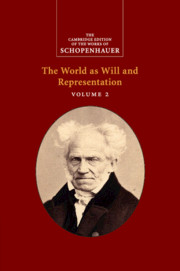Chapter 34 - On the Inner Essence of Art
Published online by Cambridge University Press: 30 June 2022
Summary
Not only philosophy but also the fine arts work at a fundamental level towards a solution to the problem of existence. In every mind that has ever devoted itself to the pure contemplation of the world there stirs a striving, however hidden and unconscious it may be, to grasp the true essence of things, of life, of existence. For this alone is of interest to the intellect as such, i.e. to the subject of cognition freed from the goals of the will and hence pure; in just the same way, the goals of the will are the only things of interest to the subject that cognizes as a mere individual. – This is why the result of every purely objective, and therefore every artistic grasp of things is one more expression of the essence of life and existence, one more answer to the question: ‘what is life?’ – Every true and successful work of art answers this question in its own way, with complete calm. But the arts speak only in the naïve and childish language of intuition, not in the abstract and serious language of reflection: their answer is therefore a fleeting image: not a lasting, universal cognition. And thus every artwork answers that question for intuition, every painting, every statue, every poem, every scene on stage: even music answers it; and in fact more profoundly than all the others since it expresses the innermost essence of life and existence in a language that is directly comprehensible even though it cannot be translated into the language of reason. All the other arts hold an intuitive image before the questioner and say: ‘look here, this is life!’ – Their answer, as correct as it might be, still only ever grants a temporary, not a total and final, satisfaction. Because they only ever offer a fragment, an example, instead of the rule, not the whole, which can only be given in the universality of the concept. To give a permanent and eternally satisfying answer to that question in the abstract, for the concept, and hence for reflection – this is the task of philosophy.
- Type
- Chapter
- Information
- Schopenhauer: The World as Will and Representation , pp. 423 - 427Publisher: Cambridge University PressPrint publication year: 2018



